Side Effects of Eating Too Many Potatoes

There are countless ways to enjoy potatoes—from crispy hash browns to air-fried tots or simply baked whole. You might say they’re the ultimate comfort food: starchy, filling, and they pair perfectly with butter and cheese. So, it’s no surprise that they’re the second most consumed food in the U.S. It’s all too easy to overload on this delicious root vegetable—but what happens to your body when you do? Experts say the side effects of eating too many potatoes aren’t exactly dangerous, but they’re still pretty nasty nonetheless.
To be clear, there’s nothing wrong with enjoying potatoes on the reg. In fact, these starchy vegetables offer a slew of health benefits. For example, registered dietitian Colleen Christensen notes that sweet potatoes are particularly high in vitamin A, which supports both healthy vision and your immune system.
“Potatoes can be a great part of a nutritious diet for a variety of reasons,” says Christensen. “They contain fiber, which helps to keep us full and satisfied. They also contain vitamin C, which is important because humans are unable to produce it and must get it from foods. Vitamin C helps with collagen synthesis and acts as an antioxidant to keep our cells healthy by protecting from oxidative damage. Additionally, potatoes contain potassium, which is important for things like muscle contraction and fluid balance.”
According to Trista Best, a registered dietitian at Balance One Supplements, potatoes also contain a type of starch called resistant starch that feeds the “good” bacteria in the gut.
Not only that, but certified nutritionist Paul Claybrook points out that they’re naturally free of fat, cholesterol, and gluten, and a great source of antioxidants—which help to neutralize free radicals that might otherwise cause damage to cells or even your DNA.
Clearly, there are lots of perks to eating potatoes. But if you accidentally go overload, you can expect one of the following not-so-pleasant side effects. Here’s why, and for even more healthy tips, be sure to check out our list of The 7 Healthiest Foods to Eat Right Now.
Your belly might hurt.
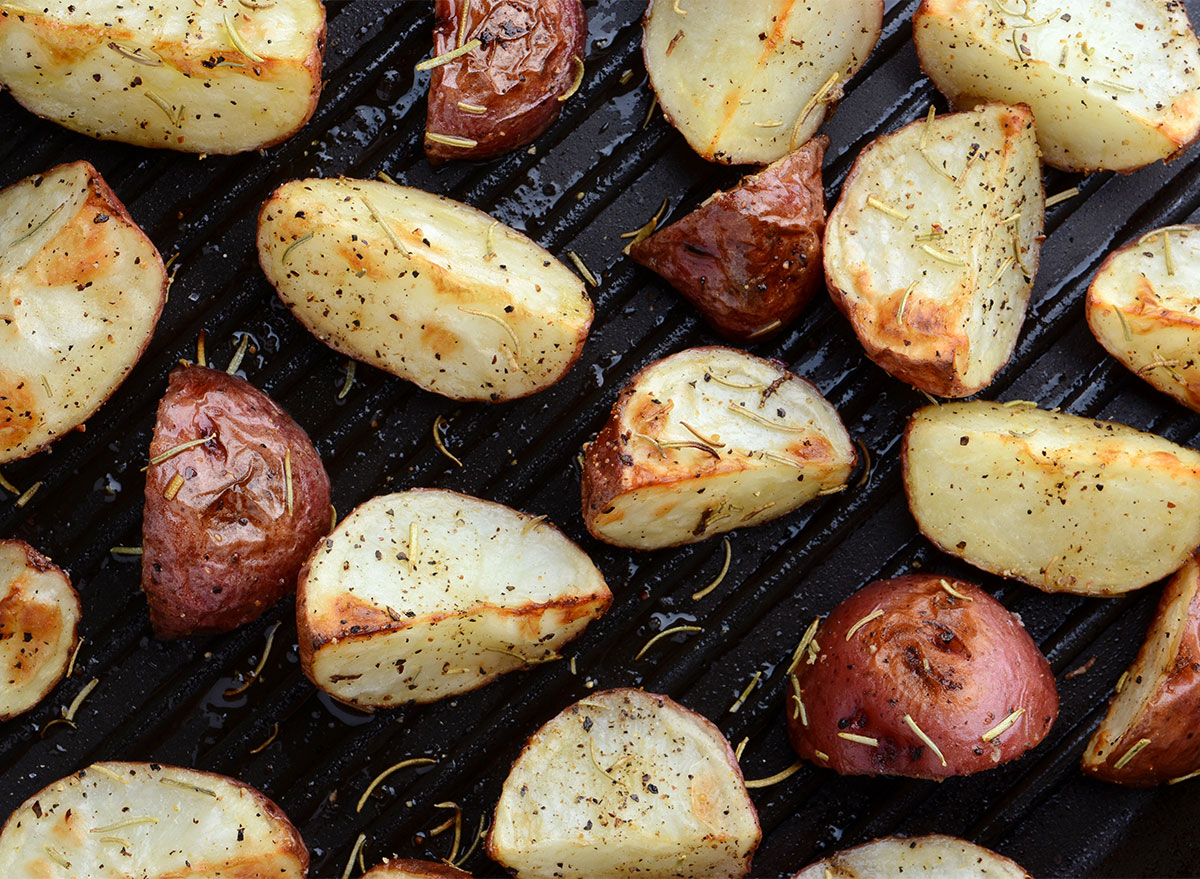
One medium potato with the skin on offers 4 grams of fiber, which not only makes you feel satiated by slowing down digestion but also helps to keep things moving, thus preventing constipation. However, because potatoes are high in starch (and thus carbohydrates), they can cause also gas when eaten in large amounts.
“Eating too many potatoes in one sitting can make you feel uncomfortable and bloated,” says Trista Best, a registered dietitian at Balance One Supplements.
According to Lisa Richards, nutritionist and creator of The Candida Diet, you’re at a higher risk for these uncomfortable side effects if you eat potatoes without any source of protein alongside them. So, your best bet for avoiding unpleasant GI symptoms is to incorporate potatoes into a well-balanced meal.
Here’s What Happens to Your Body When You Eat Potatoes.
You might turn orange—if you’re eating loads of sweet potatoes.
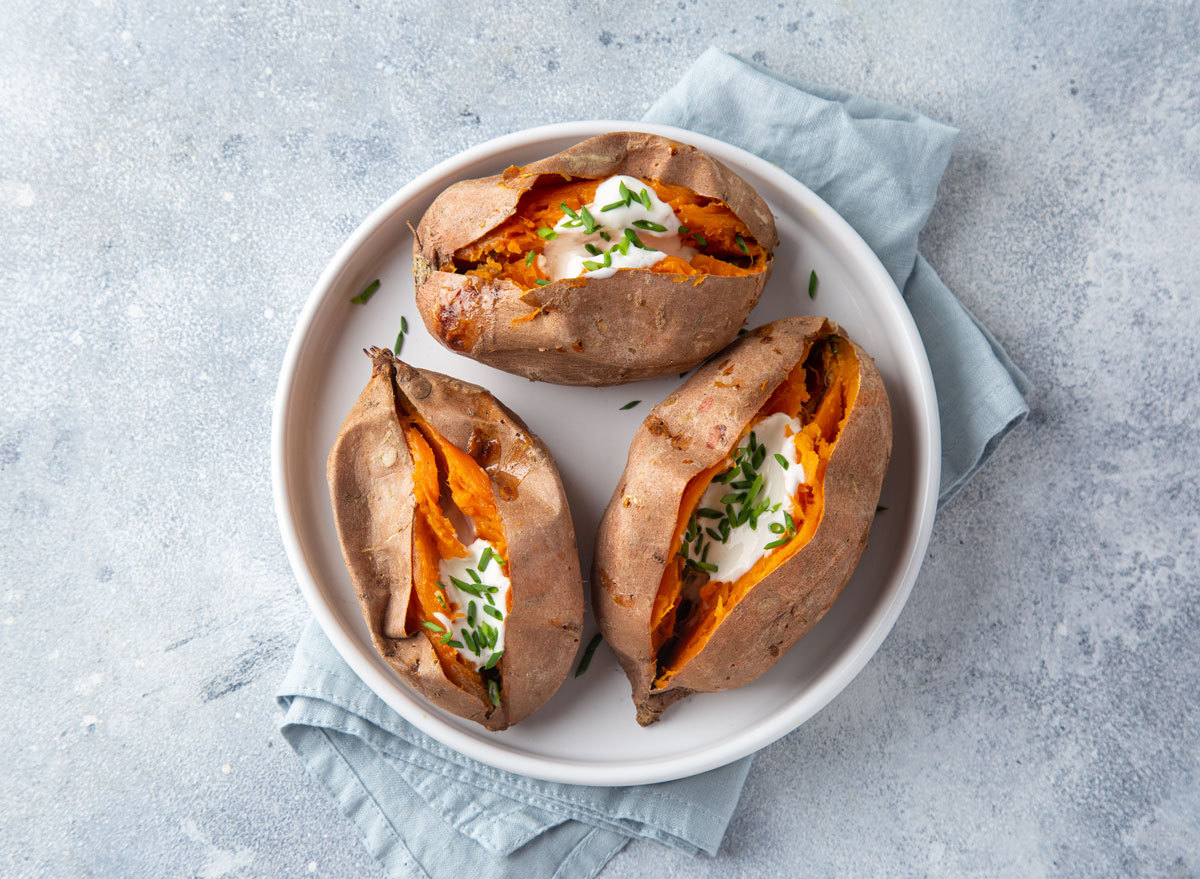
Beta-carotene, a substance that gives veggies like carrots and yams their orange hue, is an important substance that your body uses to make vitamin A. And if you’re eating sweet potatoes in large quantities, you may be consuming more beta carotene than your body knows what to do with. In fact, you might quite literally turn orange if you’re getting a lot of it over a long period of time. This condition is known as carotenemia. This isn’t exactly dangerous, as beta carotene doesn’t seem to be toxic, even in large amounts. It just looks a little funny.
However, according to The University of Rochester Medical Center, carotenemia can be problematic for people who convert beta-carotene to vitamin A—such as those with hypothyroidism.
Fortunately, all you have to do is cut back on your consumption of beta carotene-rich foods and your skin should return to its normal hue.
Get even more healthy tips straight to your inbox by signing up for our newsletter.
You could gain weight.
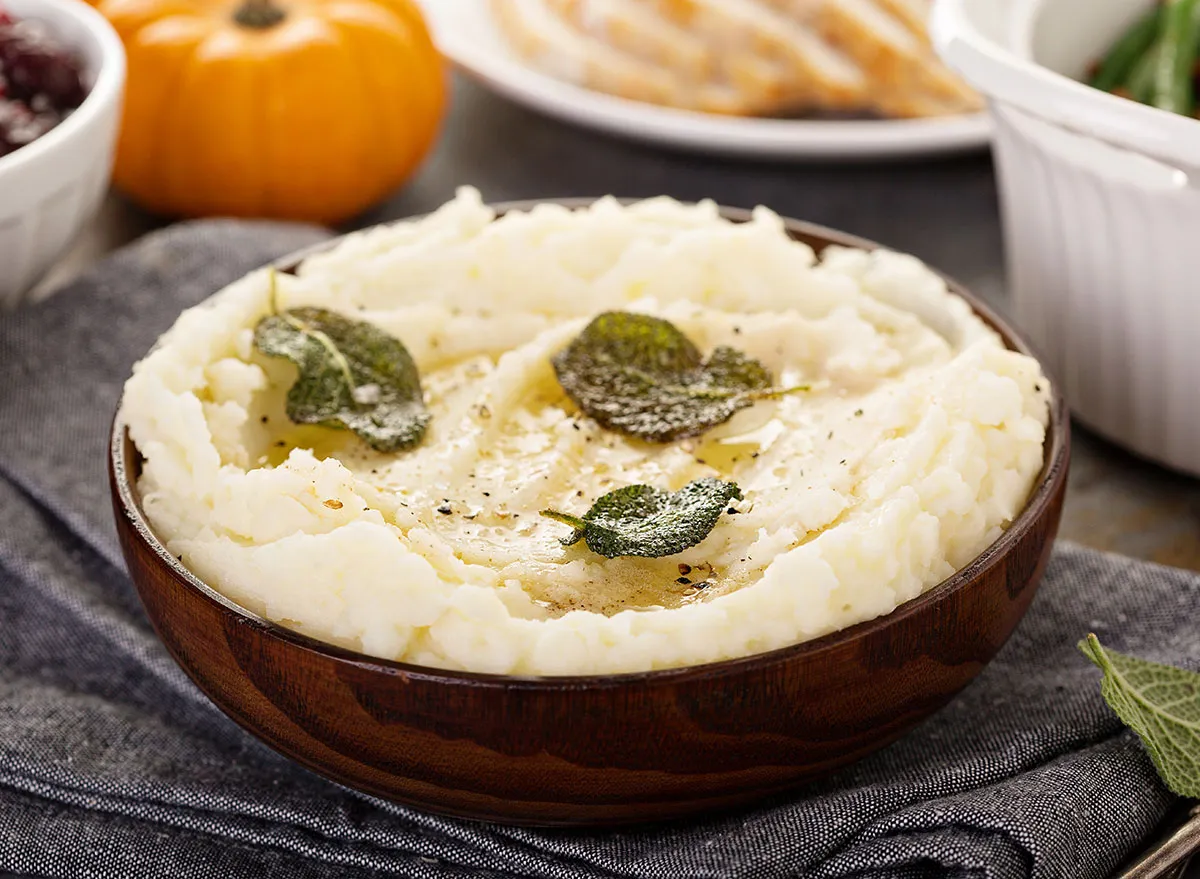
Carb-rich potatoes may get a bad rap when it comes to weight, but Richards says they’re actually an excellent food for slimming down since they’re fat-free and high in fiber.
“Potatoes that are simply air fried, baked, or steamed are very low in calories per pound and can help aid in weight loss efforts,” she says.
One 2014 study found that people who ate 5 to 7 servings of potatoes a week lost the same amount of weight as those who didn’t incorporate them into their diets.
Still, that’s only if you enjoy them in moderation and cook them in a healthy way. Obviously, deep-fried potato products and potato dishes that are loaded with sour cream, cheese, and butter, contain far more calories than potatoes that are simply roasted in a little olive oil.
According to Mayo Clinic, eating lots of potatoes can lead to increased cravings for carbohydrates, which can trigger a problematic cycle that leads to more overeating.
Here’s how it works: After you eat them, your blood sugar spikes quickly, often causing your body to release more insulin than it needs. And that excess insulin then causes your blood sugar to dip lower than normal, causing you to crave more carbs. In addition, as you eat more of these foods, your body needs to process all the extra sugar. Although some sugar is burned off as energy, the rest is often converted into fat, leading to weight gain.
Again, you can absolutely still enjoy potatoes even if you’re trying to shed pounds. But it’s worth keeping an eye on your portion sizes and being mindful of how you prepare them. Here are 18 Easy Ways to Control Your Portion Sizes.
Your blood sugar may increase.
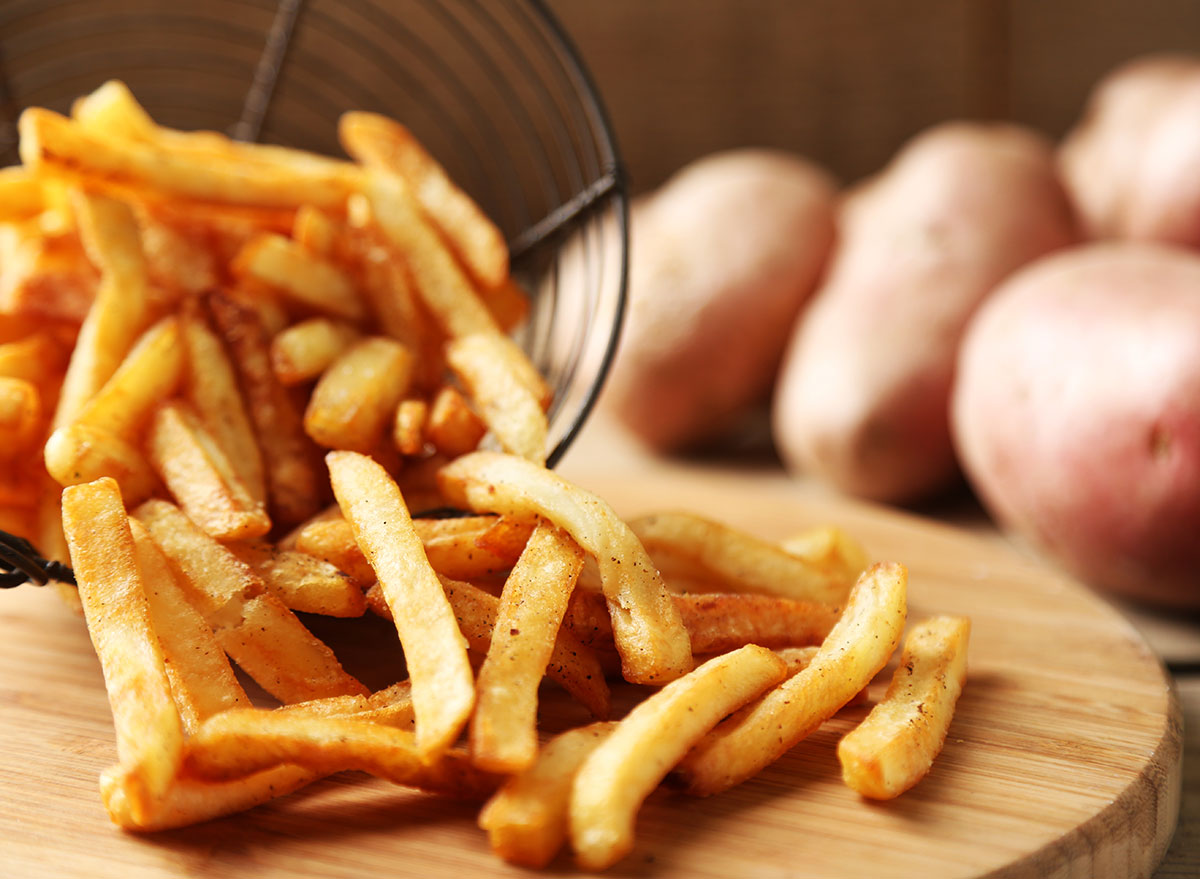
Although potatoes are considered a healthy “complex” carbohydrate, they can still spike your blood sugar. Essentially, your body converts the carbs into a simple sugar called glucose. The hormone insulin helps to transport these sugars to your cells so your body can use them for energy. Claybrook points out that potatoes are medium-high on the GI index.
“That means they do raise your blood sugar a modest amount—which for many of us is no biggie, but for diabetics, that’s a real problem,” Claybrook says.
The good news is, the dietary fiber in potatoes can help slow down the rate at which sugar gets absorbed into the bloodstream. However, when you eat too many potatoes, that’s typically canceled out due to the excess carbohydrates your body is breaking down.
What does all this mean? It’s best to stick to just one serving of potatoes at a time, particularly if you have or are at risk for diabetes.
It’s also worth noting that certain potato varieties may be less likely to spike your blood sugar than others. For example, russet potatoes have a higher GI than carisma potatoes. Additionally, whole potatoes with the skin on have a lower GI than skin-less mashed or diced potatoes. Allowing potatoes to cool down before eating them can lower their GI as well.
You might experience higher blood pressure.
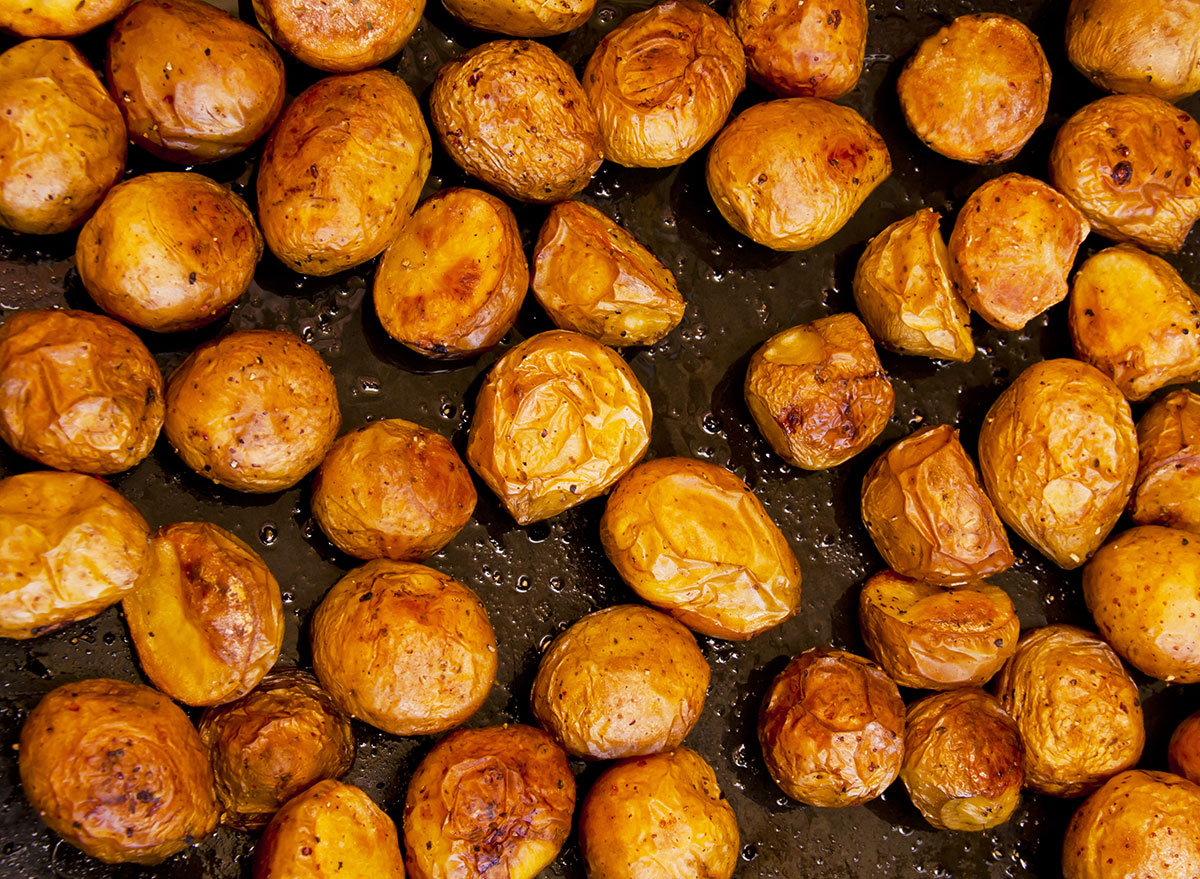
Potatoes contain three key minerals that are associated with decreased blood pressure: potassium, calcium, and magnesium. Yet Claybrook says that potatoes can actually have the opposite effect—increasing your blood pressure—if you overdo it. A 2016 20-year study found that women who ate boiled, baked, or mashed potatoes four or more times a week had an 11% increased risk of developing hypertension (high blood pressure) compared to people who only ate this starchy veggie less than once a month. Unsurprisingly, that increase was even more significant—17%—for those consuming french fries more than three times a week.
Researchers noted that while this effect was slightly more significant in women, both sexes reaped these consequences.
So, what’s the takeaway here? When potatoes are prepared simply and eaten in reasonable portions, potatoes are a nutrient-packed food that can be a part of any healthy diet — regardless of your goals.
“All forms and preparations of potatoes deliver key nutrients and fit on a healthy plate,” says registered dietitian Cara Harbstreet. “The key is variety and moderation.”
Christensen strongly recommends pairing potatoes with protein to help stabilize your blood sugar.
“Be sure to consciously switch up your food choices to ensure that you’re getting a wide variety of vitamins and minerals,” she says. “Consuming the same foods daily could potentially lead to nutrient deficiencies.”
Ready to prep some potatoes for the week? Here are 25 Healthy and Delicious Sweet Potato Recipes.








